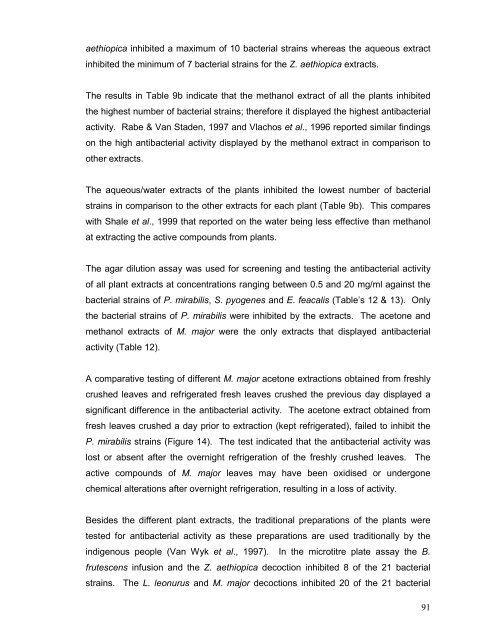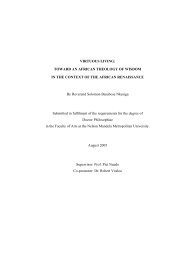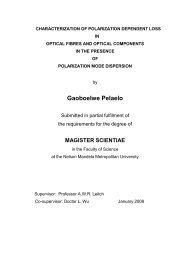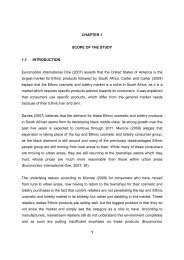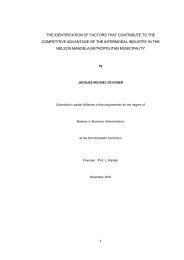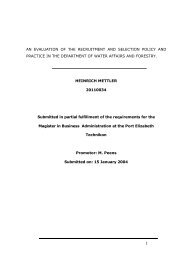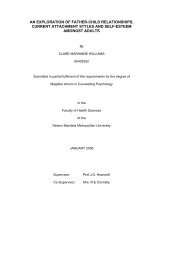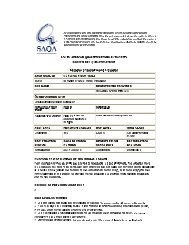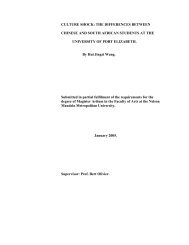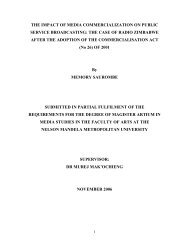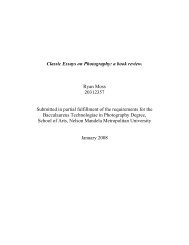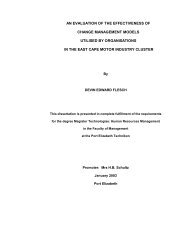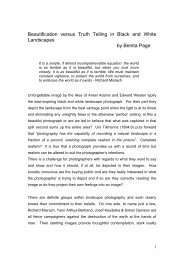an investigation into the antibacterial activities of medicinal plants ...
an investigation into the antibacterial activities of medicinal plants ...
an investigation into the antibacterial activities of medicinal plants ...
You also want an ePaper? Increase the reach of your titles
YUMPU automatically turns print PDFs into web optimized ePapers that Google loves.
aethiopica inhibited a maximum <strong>of</strong> 10 bacterial strains whereas <strong>the</strong> aqueous extract<br />
inhibited <strong>the</strong> minimum <strong>of</strong> 7 bacterial strains for <strong>the</strong> Z. aethiopica extracts.<br />
The results in Table 9b indicate that <strong>the</strong> meth<strong>an</strong>ol extract <strong>of</strong> all <strong>the</strong> pl<strong>an</strong>ts inhibited<br />
<strong>the</strong> highest number <strong>of</strong> bacterial strains; <strong>the</strong>refore it displayed <strong>the</strong> highest <strong>an</strong>tibacterial<br />
activity. Rabe & V<strong>an</strong> Staden, 1997 <strong>an</strong>d Vlachos et al., 1996 reported similar findings<br />
on <strong>the</strong> high <strong>an</strong>tibacterial activity displayed by <strong>the</strong> meth<strong>an</strong>ol extract in comparison to<br />
o<strong>the</strong>r extracts.<br />
The aqueous/water extracts <strong>of</strong> <strong>the</strong> pl<strong>an</strong>ts inhibited <strong>the</strong> lowest number <strong>of</strong> bacterial<br />
strains in comparison to <strong>the</strong> o<strong>the</strong>r extracts for each pl<strong>an</strong>t (Table 9b). This compares<br />
with Shale et al., 1999 that reported on <strong>the</strong> water being less effective th<strong>an</strong> meth<strong>an</strong>ol<br />
at extracting <strong>the</strong> active compounds from pl<strong>an</strong>ts.<br />
The agar dilution assay was used for screening <strong>an</strong>d testing <strong>the</strong> <strong>an</strong>tibacterial activity<br />
<strong>of</strong> all pl<strong>an</strong>t extracts at concentrations r<strong>an</strong>ging between 0.5 <strong>an</strong>d 20 mg/ml against <strong>the</strong><br />
bacterial strains <strong>of</strong> P. mirabilis, S. pyogenes <strong>an</strong>d E. feacalis (Table’s 12 & 13). Only<br />
<strong>the</strong> bacterial strains <strong>of</strong> P. mirabilis were inhibited by <strong>the</strong> extracts. The acetone <strong>an</strong>d<br />
meth<strong>an</strong>ol extracts <strong>of</strong> M. major were <strong>the</strong> only extracts that displayed <strong>an</strong>tibacterial<br />
activity (Table 12).<br />
A comparative testing <strong>of</strong> different M. major acetone extractions obtained from freshly<br />
crushed leaves <strong>an</strong>d refrigerated fresh leaves crushed <strong>the</strong> previous day displayed a<br />
signific<strong>an</strong>t difference in <strong>the</strong> <strong>an</strong>tibacterial activity. The acetone extract obtained from<br />
fresh leaves crushed a day prior to extraction (kept refrigerated), failed to inhibit <strong>the</strong><br />
P. mirabilis strains (Figure 14). The test indicated that <strong>the</strong> <strong>an</strong>tibacterial activity was<br />
lost or absent after <strong>the</strong> overnight refrigeration <strong>of</strong> <strong>the</strong> freshly crushed leaves. The<br />
active compounds <strong>of</strong> M. major leaves may have been oxidised or undergone<br />
chemical alterations after overnight refrigeration, resulting in a loss <strong>of</strong> activity.<br />
Besides <strong>the</strong> different pl<strong>an</strong>t extracts, <strong>the</strong> traditional preparations <strong>of</strong> <strong>the</strong> pl<strong>an</strong>ts were<br />
tested for <strong>an</strong>tibacterial activity as <strong>the</strong>se preparations are used traditionally by <strong>the</strong><br />
indigenous people (V<strong>an</strong> Wyk et al., 1997). In <strong>the</strong> microtitre plate assay <strong>the</strong> B.<br />
frutescens infusion <strong>an</strong>d <strong>the</strong> Z. aethiopica decoction inhibited 8 <strong>of</strong> <strong>the</strong> 21 bacterial<br />
strains. The L. leonurus <strong>an</strong>d M. major decoctions inhibited 20 <strong>of</strong> <strong>the</strong> 21 bacterial<br />
91


